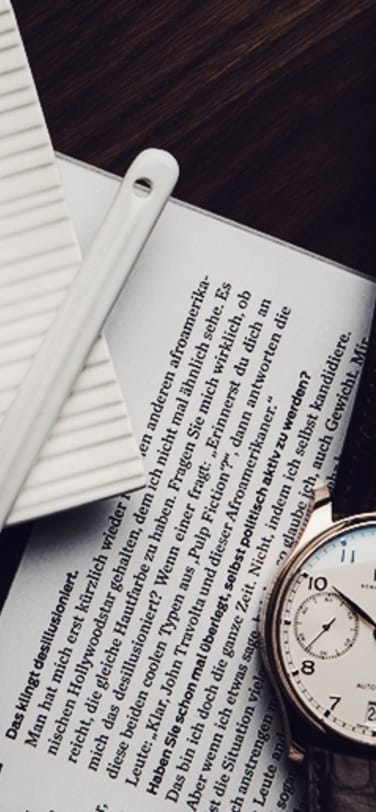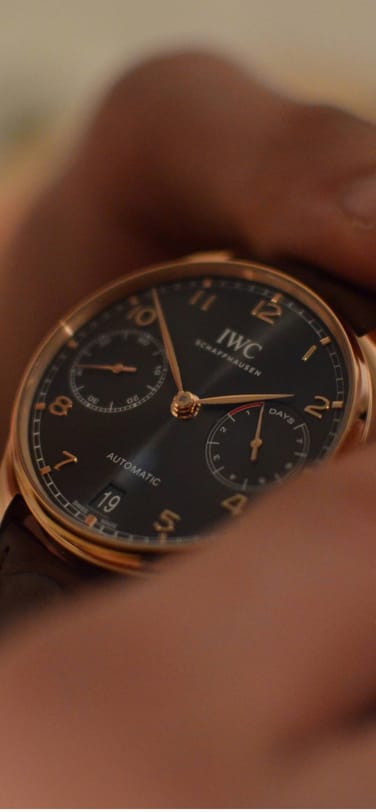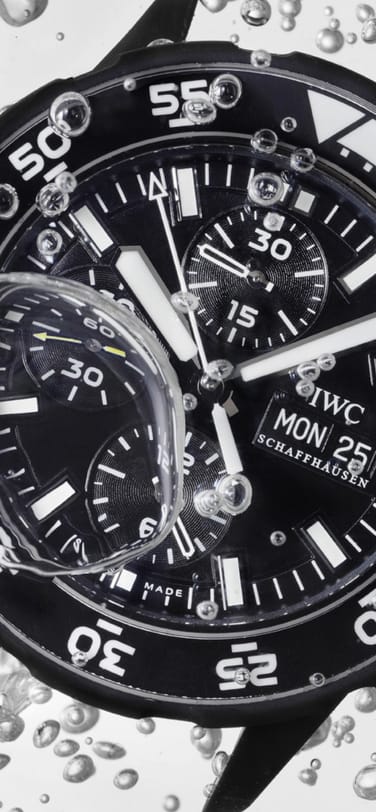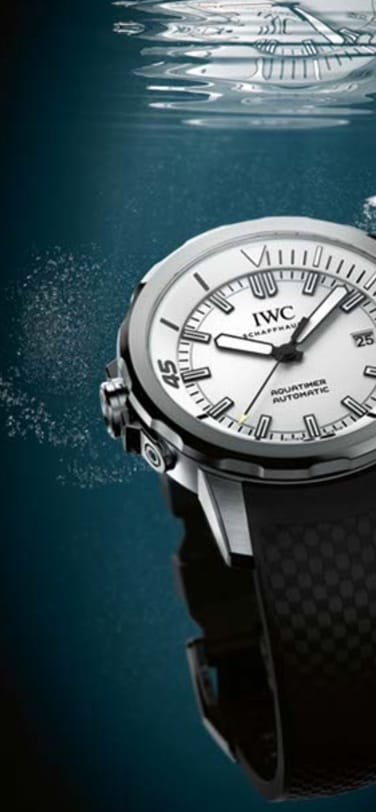Ten Tips for Watch Care
By Michael Friedberg

Your watch has enemies. They include dirt, dust, moisture, and shocks, to say nothing about temperature extremes and UV radiation. For more than a century, watchmakers like IWC have developed and utilized engineering solutions to fight these enemies. Today, technology has produced watches that are more sealed and shockproof than ever.
But still the front-line attack against these enemies must be done by the individual user. No fine mechanical watch will work well if it is maltreated, even inadvertently, and all mechanical watches are inherently intricate mechanisms, usually involving 200 to 400 movement parts, many of which are minuscule in size. To keep these parts running well requires care and maintenance.
As a watch collector for more than three decades, I've been guided by numerous principles to keep my watches in top shape. Some of these I've learned the hard way —such as dropping a watch while winding it —and others involve using common sense or following “rules” that you can find from maintenance guides on the Internet. Not surprisingly, given the diversity of opinion about watches generally, not everyone concurs about everything pertaining to watch maintenance. That's fine, too; if it works for you, that might be good enough.
But my tips are follows:

1. Keep your watch wound.
Even though modern lubricants are long lasting, they do dry or conceal over time. An appropriately lubricated watch will work better and longer. Winding keeps the watch working, and spreads the lubricants. You don't have to do this daily for every watch; for example, I have dozens of pocket watches and try to wind them once monthly.
Most watches are regulated and adjusted at a state of full wind. As the mainspring uncoils, isochronism error can creep in: it's usually slight, but accuracy should be best with a fully wound watch.
For a manual wind watch, it's a good habit to consistently wind it at the same time each day. I try to do so early in the morning as I dress for the day. For 7 or 8-day movements, I recently learned an expression: “Sunday is wind-day”.
2. Don't wind your watch on your wrist.
When you access the crown while the watch is on your wrist, most people tilt the crown side of the watch up. That creates pressure on the stem, and I've seen them bend or break.
3. Be careful where you wind your watch.
Now that you're taking the watch off your wrist to wind it, don't wind it walking down the street or anywhere there's a hard surface. I once wound my Regulateur Tourbillon in the bathroom, and it fell on the tile floor. My beloved watch thankfully survived with just a few nicks, but I think my heart stopped for seconds. Lesson learned.

4. Keep it clean, but never with soap.
A really dirty watch doesn't look good, and sometimes small particles of debris can work their way inside. I just use a microfiber polishing cloth on the watch. A little water won't hurt, assuming your crown is fully secure and you avoid getting the leather strap wet. But never use soap and water. The molecules in the soap can work their way into really small spaces and not help your watch at all.

5. Speaking of water, check those gaskets and seals regularly.
A watch might have a high water resistance rating, but the material used in gaskets and seals can dry out, impairing a watch's water resistance. If you swim or shower with your watch, you might even want to check water resistance annually. Many watchmakers have machines to check water resistance via pressure settings, and it is not a costly nor time-consuming test.
If I'm not wearing a diving watch with extraordinary water resistance, but am caught in a torrential downpour, I'll even take my watch off my wrist and place it in my pocket.
6. Use your warranty effectively.
IWC warrants its watches for eight years from the date of purchase, absent problems caused by misuse. If you have minor problems with your watch and can wait, it often makes sense to send in your watch for warranty “repair” shortly before the end of the warranty period. That in effect will extend your warranty another full year. It also allows you to get everything resolved at once.

7. Don't push your luck or test your watch to its limits.
I've heard about owners who wanted to find out if their watch was bullet-proof by putting it in the freezer. That's not something I understand relative to a fine, intricate and costly instrument.
I —and I know many others —have worn their automatic watches while playing golf, tennis, or other sports. Despite high survival rates (after all, these watches are tough), I'm unsure that this makes sense. Fortunately for my watch, but unfortunately for my golf game, my stroke just doesn't have the power of a pro's swing. But all I need is one good impact, and the watch will have a problem.
I recall one collector from Scandinavia asked if his IWC watch could withstand him chopping wood. And I recall a rider in the Tour de France wearing a fine watch. I'm unsure why either person would want to test his mechanical watch to that extent.
Keep in mind that an automatic watch winds with an oscillating weight. All mechanical watches work due to swings in the lever escapement. And the shock protection mechanisms used in modern watches, KIF or Incabloc, are excellent but do not provide perfect protection from all blows at all angles.
Perhaps I'm too protective an owner, but I never understood why the Tour de France rider would risk even scraping his watch if he crashed. But perhaps that's just me.
8. Changing straps should be done very carefully.
Extreme shocks can damage any watch mechanism, and scratches to the case, in contrast, are minor. But most collectors understandably don't like scratches and try to avoid them. One of the easiest ways to scratch your watch lugs is to try changing a strap. One expert I know designed a watchmaking course, and placed strap changing in Part 2, after basic movement disassembly and assembly. It’s not that easy to do well!
To change straps, learn how to do it, either by someone teaching you or at least digesting an online instructional video. Use only the right tool, a so-called springbar tool, and never a knife. I believe in using high quality tools and many believe that the Swiss Bergeon ones are excellent. The difference in cost is nominal, and lesser quality tools ones usually have thicker forks at the end which also might move slightly.
If you must perform this surgery, consider practicing on a lesser quality watch first. Always work from the back side, so any slips —and scratches—will be less noticeable. If you're uncertain whether you might slip, consider placing masking tape first on your watch lugs.

9. Service really is important.
Lubricants do dry or congeal over time. Cogs and teeth wear. In just one day, most modern watches make 691,200 beats. A fine mechanical watch needs to be serviced regularly.
Having your watch receive periodic service is not a profit-making attempt by the watch industry. Although servicing after warranty can be costly, it usually costs the company more. IWC actually loses money on service. There are many reasons for this, including the need to maintain an inventory of hundreds of thousands of parts and also the fact that servicing a watch involves twice the watchmaking work. For a complete service, a watch needs to be fully disassembled and then reassembled. Reassembly often is more difficult than on a new watch, since parts have worn and no longer fit perfectly.
The question everyone asks is how lengthy an interval should there optimally be between full servicings. Personally, I have a watch serviced when it appears to need service. One watchmaker told me that watches let you know when they need service: symptoms manifest themselves. The watch runs intolerably too slow or fast, or worst of all simply stops. Or the watch doesn't stay wound, the date doesn't change despite being wound, and so on.
Sometimes, a perceived problem is minor and the watch doesn't need a full overhaul. Having a good relationship with an authorized dealer can help, since they can give you an educated second-opinion on your service needs.

10. Enjoy your watch!
Someone once said that if everyone saw all the things that could go wrong with childbirth, no one would have children. Here, if one assesses all the problems a mechanical watch might have, few people would want or enjoy them. That's a huge mistake.
In fact, the problems with mechanical watches are extraordinarily few and far between, especially given the complexity of even a simple “time only” model. Most issues simply are easily and quickly fixable. From the owner's perspective, to my thinking the basic rule is “keep it gentle”. Don't push the limits of your watch.
Please do wear your watch. It is meant to be enjoyed. A fine watch should not be relegated to a locked safe, but is meant to be worn. In fact, wearing it helps it work: it allows the watch to stay wound and for the lubricants to work. Wearing an IWC watch defines you and helps you appreciate it even more.